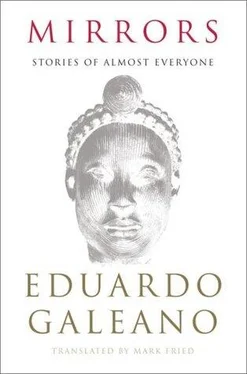
The Declaration of Independence affirmed that all men are created equal.
Shortly thereafter, the Constitution of the United States clarified the concept: it established that each slave was worth three-fifths of a person.
One drafter of the Constitution, Gouverneur Morris, opposed this provision, but in vain. Not long before he had tried, also in vain, to get the State of New York to abolish slavery, and managed to extract a constitutional promise that in the future “every being who breathes the air of this State shall enjoy the privileges of a freeman.”
Morris, a central figure at the moment the United States acquired a face and a soul, was a founding father that history forgot.
In the year 2006, Spanish journalist Vicente Romero looked for his grave. He found it behind a church in the South Bronx. The gravestone, erased by rain and sun, provided a platform for two large garbage cans.

Robert Carter was buried in the garden.
In his will he asked “to be laid under a shady tree, where he might be undisturbed, and sleep in peace and obscurity. No stone, nor inscription.”
This Virginia patrician was one of the richest, if not the richest, of all the prosperous landowners who broke ties with England.
Although several other founding fathers looked askance at slavery, none of them freed their slaves. Carter was the only one to unchain the four hundred and fifty blacks he owned “to allow them to live and work according to their own will and pleasure.” He freed them seventy years before Abraham Lincoln abolished slavery, and he did so gradually, taking care that none was simply turned out and deserted.
Such folly condemned him to solitude and oblivion.
He was cut off by his friends, his neighbors, and his family, all of whom were convinced that free blacks were a threat to personal and national security.
Later on, his acts were rewarded with collective amnesia.

When Jefferson lost his wife, her property became his. Among other goods, he inherited Sally.
There is testimony of her beauty in her early years.
Later on, nothing.
Sally never spoke, or if she did either no one listened or no one bothered to write it down.
Of President Jefferson, in contrast, we have several portraits and many words. We know that he harbored well-founded suspicions that “the blacks are inferior to the whites in the endowments both of the body and the mind,” and that he always expressed “great aversion” to the mixing of white blood and black blood, which to him was morally repugnant. He believed that if the slaves were one day to be freed, the peril of contamination would have to be avoided by removing them “beyond the reach of mixture.”
In 1802, journalist James Callender published an article in the Richmond Recorder which made public what everyone knew: President Jefferson was the father of Sally’s children.
DEATH TO TEA, LONG LIVE COFFEE

The British Crown decreed that its colonies had to pay an unpayable tax. In 1773, furious colonists in North America sent forty tons of London tea to the bottom of the harbor. The operation was dubbed the Boston Tea Party. And the American Revolution began.
Coffee became a symbol of patriotism, though there was nothing patriotic about it. It had been discovered who knows when in the hinterland of Ethiopia, when goats ate the red fruit of a bush and danced all night, and after a voyage of centuries it reached the Caribbean.
In 1776, Boston’s cafés were dens of conspiracy against the British Crown. And years later, President George Washington held court in a café that sold slaves and coffee cultivated by slaves in the Caribbean.
A century later, the men who won the West drank coffee by the light of their campfires, not tea.

Presidents of the United States tend to speak in God’s name, although none of them has let on if He communicates by letter, fax, telephone, or telepathy. With or without His approval, in 2006 God was proclaimed chairman of the Republican Party of Texas.
That said, the All Powerful, who is even on the dollar bill, was a shining absence at the time of independence. The constitution did not mention Him. At the Constitutional Convention, when a prayer was suggested, Alexander Hamilton responded:
“We don’t need foreign aid.”
On his deathbed, George Washington wanted no prayers or priest or minister or anything.
Benjamin Franklin said divine revelation was nothing but poppycock.
“My mind is my own church,” affirmed Thomas Paine, and President John Adams believed that “this world would be the best of all possible worlds, if there were no religion in it.”
According to Thomas Jefferson, Catholic priests and Protestant ministers were “soothsayers and necromancers” who divided humanity, making “one half the world fools and the other half hypocrites.”
A PROLOGUE TO THE FRENCH REVOLUTION

Down the main street of Abbeville marched the procession.
Everyone on the sidewalks doffed their hats when the host, raised high above the crosses and saints, passed by. Everyone, that is, except for three young men who had their eyes on the girls in the crowd and did not notice.
They were charged. Not only had they refused to bare their heads before the white flesh of Jesus, they had smirked at it. Witnesses brought additional grave evidence: the host had been broken, causing it to bleed, and a wooden cross had been found mutilated in a ditch.
The tribunal focused its bolts of ire on one of the three, Jean-François de La Barre. Although he had just turned twenty, that insolent young man bragged that he had read Voltaire, and he defied the judges with his stupid arrogance.
The day of the execution, a fine morning in the year 1766, no one was missing from the market square. Jean-François climbed the scaffold with a sign hanging from his neck:
“Impious, blasphemer, sacrilegious, execrable, abominable.”
The executioner tore out the tongue of the condemned man and cut off his head. He chopped up the body and threw the pieces into a bonfire. Along with the body parts, he tossed in a few of Voltaire’s books, so that author and reader could burn together.
ADVENTURES OF THE MIND IN DARK TIMES

Twenty-seven volumes.
The figure is not so impressive considering the seven hundred and forty-five volumes of the Chinese encyclopedia, published a few years previous.
But the French L’Encyclopédie put its seal on the Enlightenment and in a way offered the light that gave it its name. The pope in Rome ordered that blasphemous book burned and he excommunicated anyone found in possession of it. The authors, Diderot, D’Alembert, Jaucourt, Rousseau, Voltaire, and several more, risked or suffered jail and exile, but the influence of their great collective work was felt all over Europe.
Two and a half centuries later, their invitation to think is still astonishing. A few definitions, plucked from its pages:
Читать дальше



















